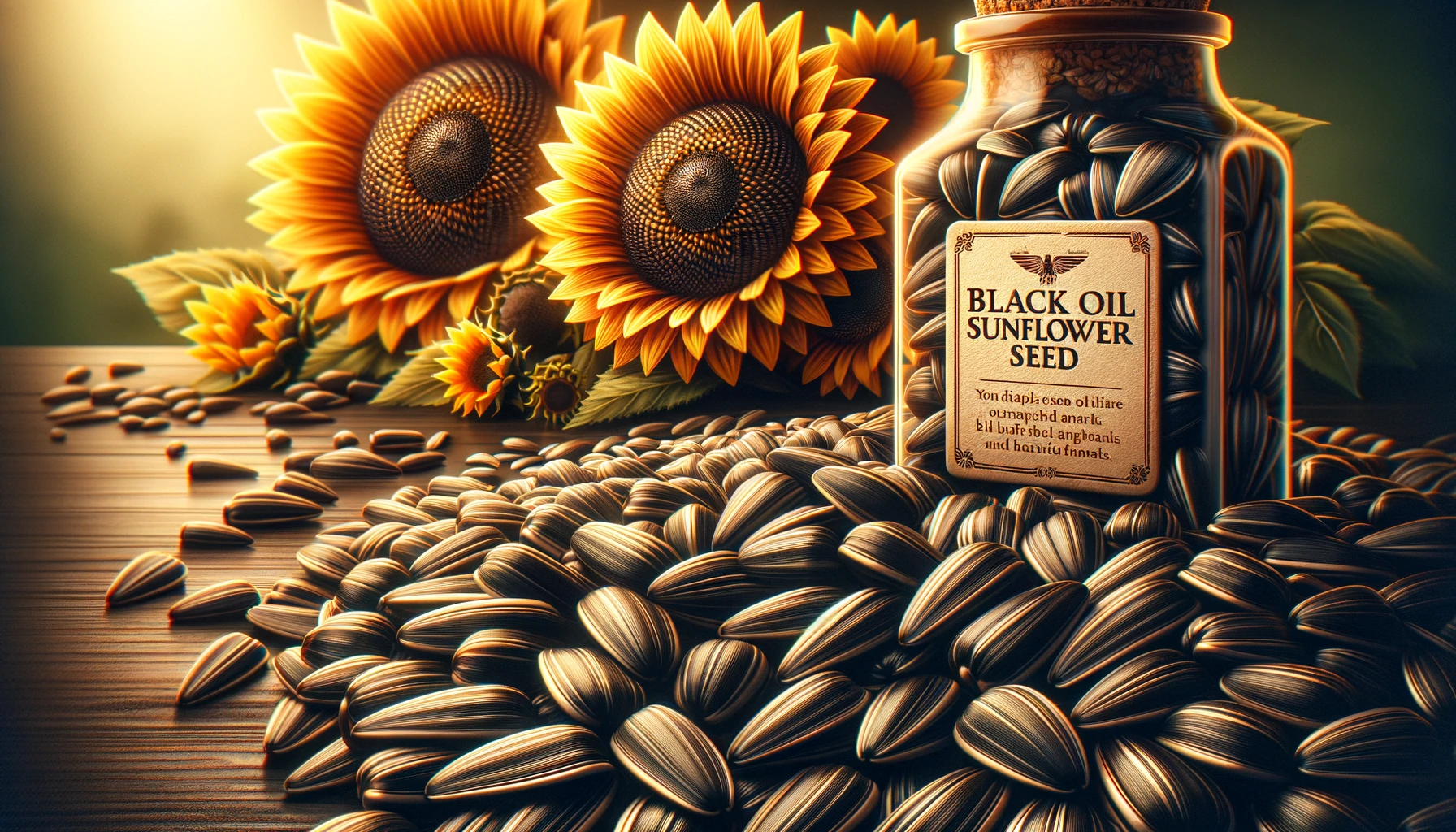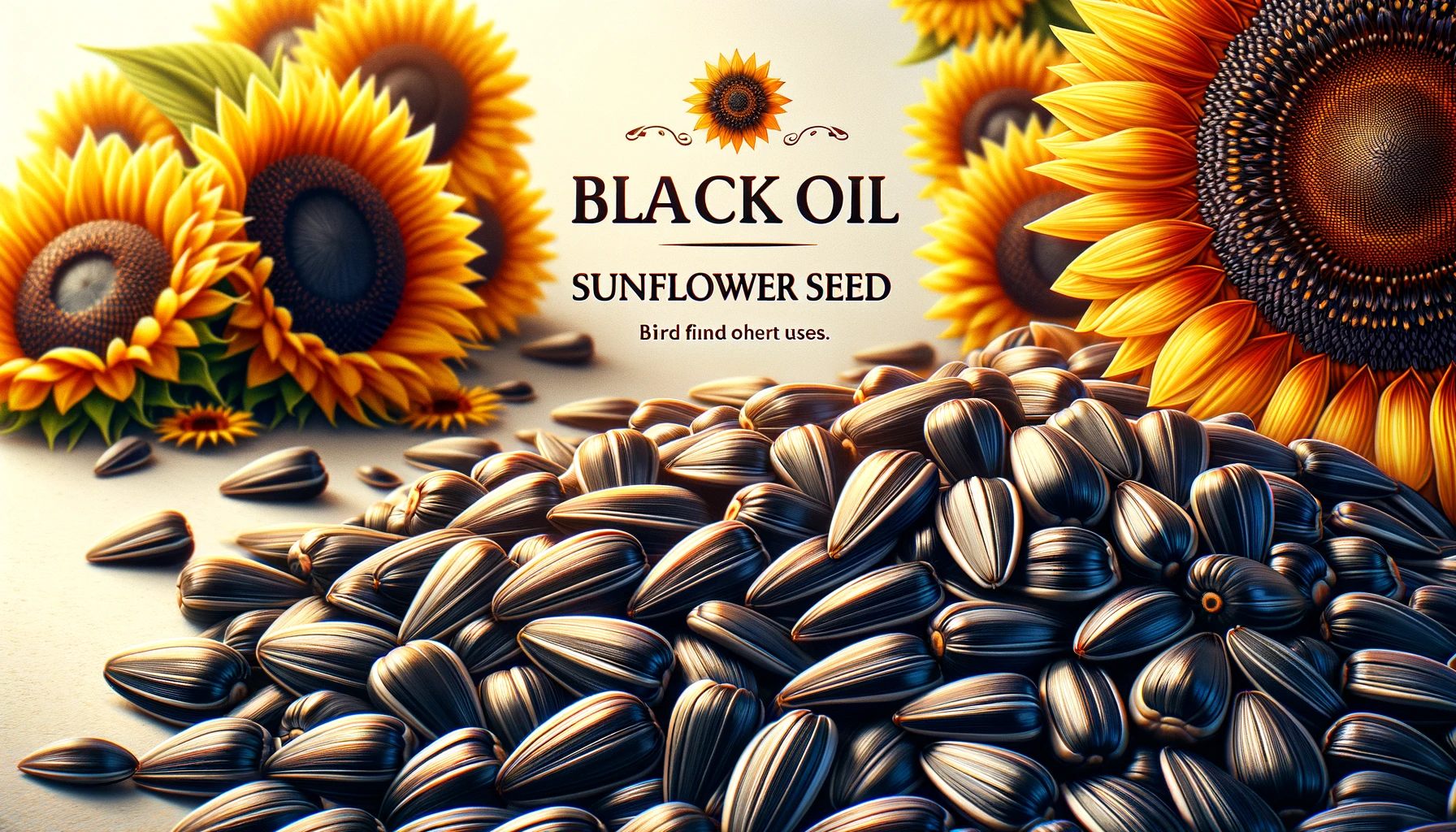Black Oil Sunflower Seeds for Wild Bird Food
Overview
Black oil sunflower seeds are a marvel of nature, small in size but enormous in impact. Derived from the common sunflower (Helianthus annuus), these seeds are distinguished by their thin cover and high oil content, making them especially valuable. They serve a dual purpose: acting as a crucial component in bird feed and playing a significant role in human nutrition. Their adaptability and ease of growth have made them a favorite among gardeners and farmers worldwide, contributing to their significance in agriculture and wildlife conservation.
Benefits of Gardening and Wildlife Feeding
In gardening, black oil sunflower seeds are celebrated for attracting various birds, from finches to cardinals, creating a vibrant ecosystem in one’s backyard. Their high oil content provides essential nutrients and energy to wildlife, particularly in the colder months when food sources are scarce. Moreover, these sunflower plants benefit the garden, attracting pollinators while their tall, sturdy stalks add beauty and structure.
- Improves mental health: Gardening and wildlife feeding can reduce stress, improve mood, and increase feelings of happiness and well-being.
- Enhances biodiversity: Encouraging wildlife into your garden through feeding can support local ecosystems and promote biodiversity.
- Physical exercise: Gardening activities such as planting, weeding, and digging provide a moderate physical workout, improving overall physical health.
- Educational opportunities: Engaging in gardening and feeding wildlife offers learning experiences about nature, plant life cycles, and the environmental impact of supporting local wildlife.
Nutritional Profile and Uses
Nutritionally, black oil sunflower seeds are a powerhouse, packed with healthy fats, protein, fiber, and essential vitamins and minerals such as Vitamin E, magnesium, and selenium. For humans, these seeds can be consumed raw or roasted, incorporated into dishes for added texture and nutritional value, or pressed into oil used in cooking and cosmetics. Their versatility and health benefits make them a valuable addition to any diet.
Garden Plant Cultivation and Harvesting
Best Practices for Growing Black Oil Sunflower Seeds
Growing black oil sunflower seeds is rewarding, with a few best practices ensuring success. Firstly, these sunflowers thrive in full sun and well-drained soil. Planting should occur after the last frost when the soil has warmed.
Space the seeds about 6 inches apart in rows, covering them with 1 to 2 inches of soil. Regular watering, especially during germination and early growth phases, is crucial. Additionally, because they can grow quite tall, in some cases up to 6 feet or more, they may require support to prevent the stems from bending or breaking.
Timing and Methods for Harvesting
The timing of the harvest is critical to yielding quality seeds. Sunflowers are ready to harvest when the backs of their heads turn yellow to brown and the seeds are plump and fully black. This typically occurs in late summer to early fall. To harvest, cut the flower heads with several inches of stem attached and hang them upside down in a dry, ventilated space to dry out fully. This process can take several weeks.
- Wait for the Right Time: Harvest when the backs of the flower heads turn brown and the seeds are plump, usually late summer to early fall.
- Cut the Flower Heads: Use scissors or garden shears to cut the heads off the plants, leaving a few inches of stem.
- Dry the Seeds: Hang the flower heads upside down in a dry, well-ventilated area for a few weeks until fully dry.
- Remove the Seeds: Once dry, rub the heads over a container to dislodge the seeds, or shake them loose directly into the container.
Processing and Storing Seeds
Once the seeds are dry, they can be removed by rubbing the heads over a wire mesh or simply shaking them loose. To prepare the seeds for storage, ensure they are thoroughly dry to prevent mold. They can be stored in an airtight container in a cool, dark place for several months. If intended for human consumption, the seeds can be roasted to enhance flavor and extend shelf life. For feed, they can be left raw and stored similarly.
Growing black oil sunflower seeds is a simple and gratifying process that yields multiple benefits, from enhancing garden biodiversity to providing nutritional value. With minimal effort, gardeners can enjoy the beauty these flowers bring to the landscape and the bounty of seeds they produce for wildlife and human enjoyment.
- Clean the Seeds: Remove debris or plant material from the seeds after harvesting.
- Dry Thoroughly: Ensure seeds are completely dry to prevent mold; additional drying may be necessary after cleaning.
- Store Properly: Place the dried seeds in an airtight container and store in a cool, dry place away from direct sunlight.
- Check Regularly: Inspect stored seeds periodically for any signs of moisture or spoilage, and use within a year for best quality.
The Role of Black Oil Bird Seed in Wildlife Conservation
Attracting Birds and Biodiversity Benefits
Black oil sunflower seeds are a magnet for birds, drawing an array of species to the garden. Their high oil content offers essential nutrients, making them an ideal food source, especially in winter when food is scarce. This attraction of wild birds creates a bustling ecosystem in the garden, where each bird plays a role in maintaining the environment’s health. They act as pest controllers by eating insects and as pollinators for many plants, contributing significantly to the biodiversity and health of local ecosystems.
Impact on Local Ecosystems
Introducing black oil sunflower seeds into the environment has a broader ecological impact beyond feeding birds. They support local wildlife conservation efforts by providing a reliable food source and encouraging species diversity. This diversity strengthens ecosystem resilience, helping maintain balance and supporting various plant and animal life. Additionally, cultivating sunflowers contributes to soil health and supports beneficial insect populations, including bees and butterflies.
Case Studies and Success Stories
Several success stories underscore the value of black oil sunflower seeds in conservation efforts. For instance, regions that have seen a decline in certain bird populations have reported positive changes. when local communities started planting sunflowers and providing seeds for feeders. Birdwatching clubs and conservation groups often promote using black oil sunflower seeds to increase bird sightings and diversity. These efforts enhance local biodiversity and raise awareness about the importance of wildlife conservation.

Culinary and Health Aspects of Black Oil Sunflower Seeds
Nutritional Benefits for Humans
Black oil sunflower seeds are beneficial not just for wildlife but also for humans. Rich in unsaturated fats, they can help lower cholesterol levels and improve heart health. They are also a good source of antioxidants, vitamin E, and minerals like magnesium and selenium, which support immune function and reduce inflammation. Their high fiber content aids digestion and can help with weight management by promoting a feeling of fullness.
Culinary Uses of Sunflower Seeds
In the culinary world, black oil sunflower seeds are versatile ingredients. They can be sprinkled over salads for extra crunch, baked into bread for added texture, or blended into smoothies for a nutritional boost. Roasted and seasoned, sunflower seeds make a healthy, satisfying snack. Sunflower seed butter is a popular alternative to nut butter, offering a similar texture and taste profile but distinct nutritional benefits. Pressed from the seeds, sunflower oil is a light, healthy cooking oil that retains the seeds’ nutritional properties.
Comparing Black Oil Sunflower Seeds with Other Varieties
While black oil sunflower seeds are lauded for their high oil content and nutritional value, other varieties are worth noting. Striped sunflower seeds, for example, have a thicker cover and are often larger, making them more challenging for small birds to eat but favored for human consumption. Non-oil-seed sunflowers are cultivated primarily for their edible seeds or ornamental value.
Black oil seeds are superior for bird feed due to their easy-to-crack shells and high energy content, whereas striped and other varieties might be preferred for specific culinary applications or aesthetic purposes in gardening. Incorporating black oil sunflower seeds into conservation efforts and dietary practices showcases their multifaceted value. These seeds play a crucial role in supporting wildlife and promoting biodiversity and offer significant health and culinary benefits, making them a worthwhile addition to any garden or kitchen.

1 thought on “Black oil sunflower seed”